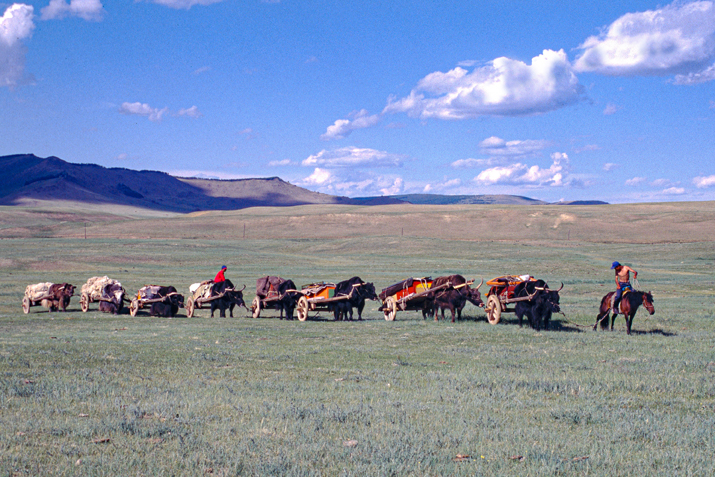
Arrival in the land of wolves
N 50°30'401'' E 100°09'646''
Day: 93
Sunrise:
07:57
Sunset:
18:09
As the crow flies:
15,97
Daily kilometers:
20
Total kilometers:
914
Soil condition:
Meadow, gravel, forest floor
Temperature – Day (maximum):
8°C
Temperature – day (minimum):
minus 3°C
Temperature – Night:
minus 12°C
Latitude:
50°30’401”
Longitude:
100°09’646”
Maximum height:
1800 m above sea level
Time of departure:
12:50
Arrival time:
17:20

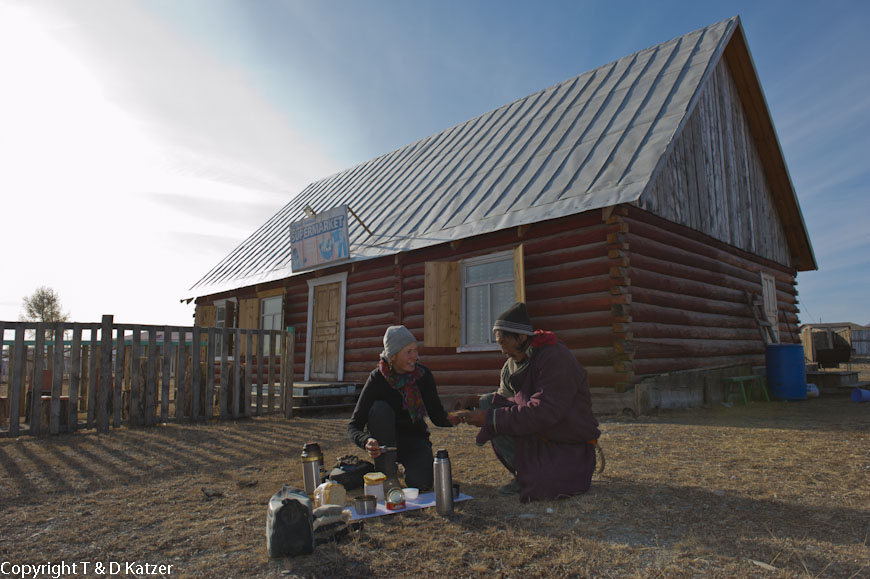
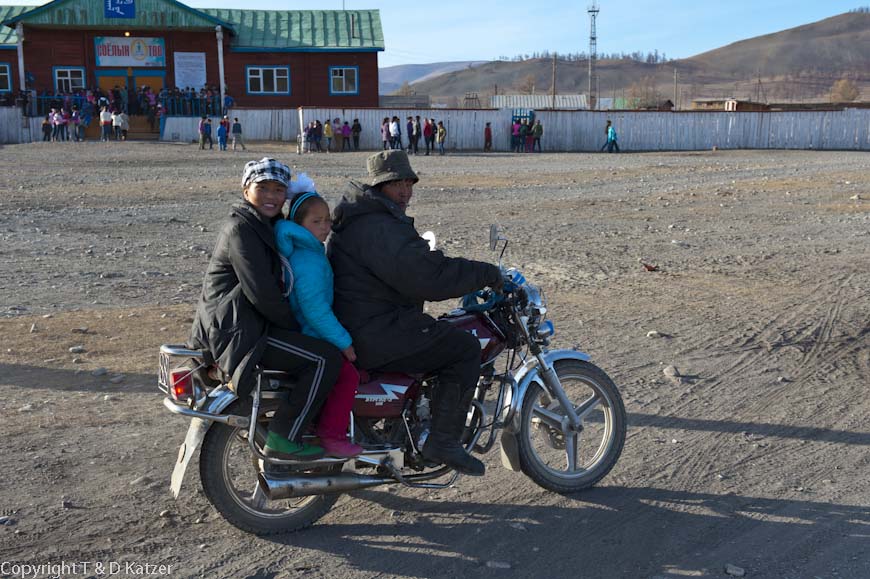



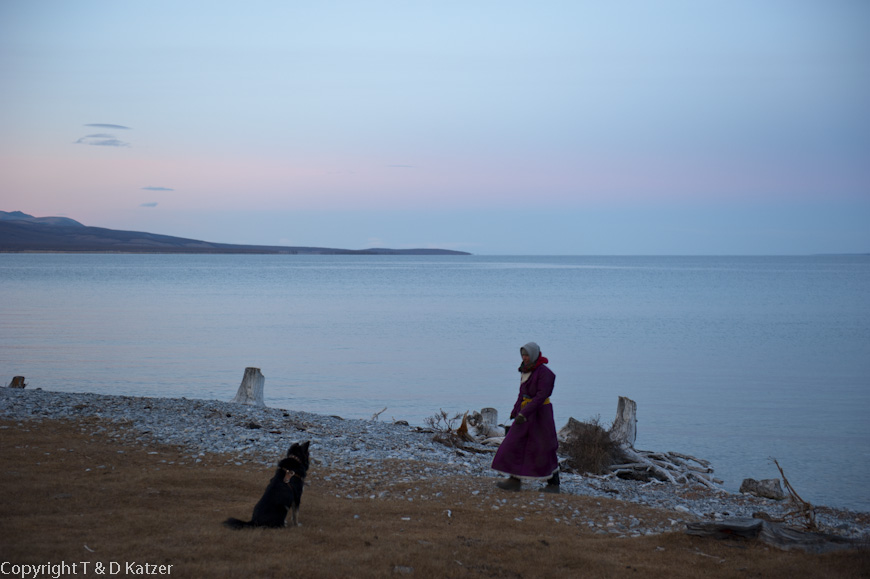
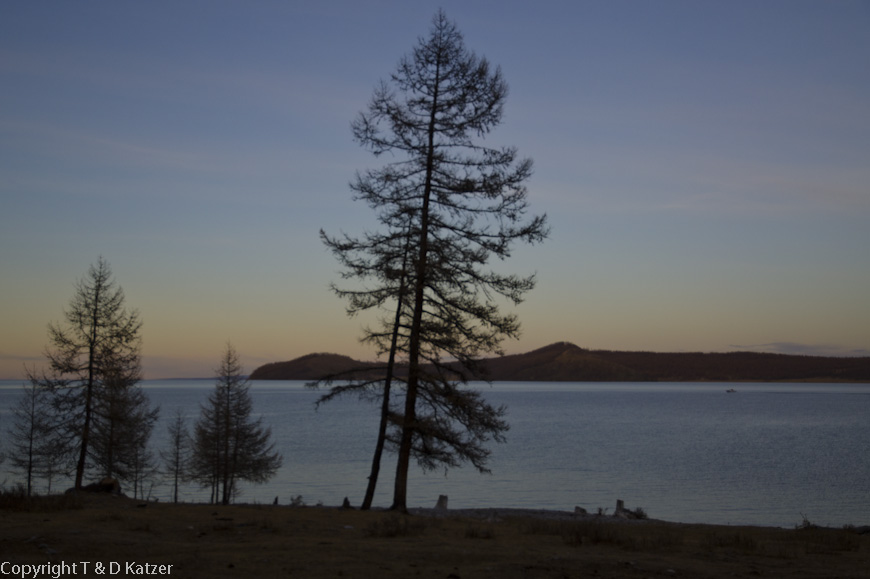

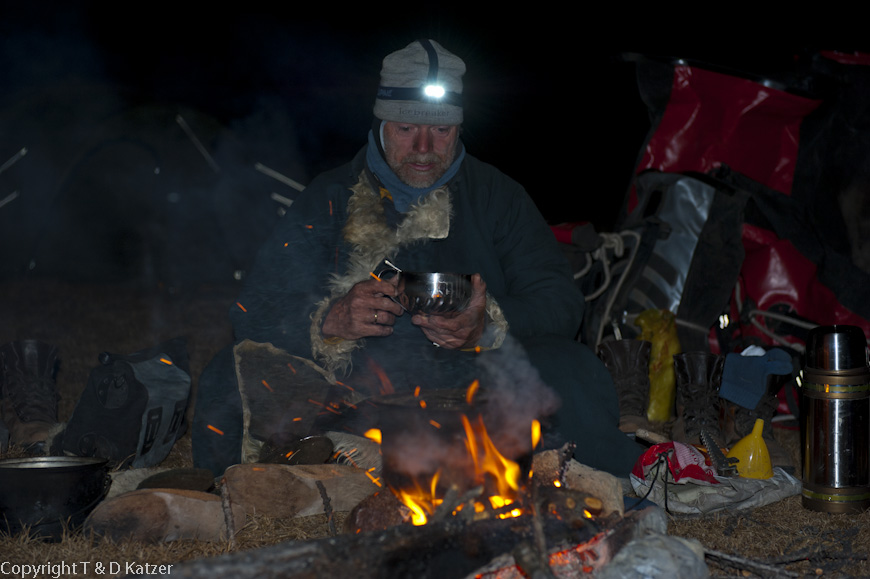
Four days ago, on 01.12.2011, the hard disk of our laptop gave up the ghost. We assume it was too cold when I started the laptop. This is of course the ultimate disaster for live reporting and a shock for me. Especially when you are in the taiga. Despite regular backups, 12 days of short recordings and the captions of 1,800 images are lost for the time being. We spent a day trying everything we could to get the hard disk to work. Without success. Then I set up Tanja’s notebook so that I could get on with it. When I tried to connect the external backup hard disk with all the data, it didn’t show the slightest reaction. All this at the current low temperatures of minus 33 °C. Phew, you wouldn’t wish for something like that even in a country where computer specialists are available everywhere. Well, the replacement computer is now running and the external hard disk has decided to work. This means that you can now accompany us live again with a time delay. All the texts I write are published on the net at the same time. We hope you will remain loyal to us. Have fun experiencing and empathizing with our adventures.
Sunny greetings from the icy taiga
Denis & Tanja
Arrival in the land of wolves
“Looks like a snow castle. All ice around us,” Tanja whispers through the down of her sleeping bag. “Hm, that’s our breath condensing on the tent wall and forming ice crystals,” I reply. Neither of us feel the slightest desire to slip out of our warm sleeping bags and be greeted by the cold of the morning. “You should film it,” says Tanja. “Hm,” I reply, a little reluctantly because I don’t feel the slightest inclination to do so. Nevertheless, I unzip my sleeping bag and grab the camera bag to get the camcorder out. Because of the cold, I can only open the zipper with great effort. As soon as I have the video camera in my hand, the lens fogs up. I rub it clean several times and switch it on. “I can’t believe it. Zero minutes of battery life. Yesterday it was 300 minutes. The lithium batteries are breaking down in these temperatures. No chance of using the camera,” I say disappointedly and put it away again. We take off our sleeping clothes and slip into our thick winter clothing. Ice crystals trickle down on us when we touch the storage net above us. They cover clothing and equipment like snow. Of course they don’t thaw because of the cold, so nothing gets wet. We simply shake them down and later I sweep four handfuls of ice out of the tent.
It’s still minus 10 °C outside at 9:30 am. The terrible wind from last night is still blowing around our noses. “Oglooniimend, (good morning) Bilgee. Did you freeze tonight?” I ask anxiously. “Baihgui hujten, (Not cold) Your hot water bottle helped me,” he laughs.
Surrounded by a curious herd of horses, we set up camp on the backs of our animals. It’s 12:50 when we climb into the saddles. This time I blame our late start on the cold. Working with stiff limbs is simply slower. It feels as if the lubricating oil in the joints is missing.
“Choo! Choo! Choo-choo!”, we drive our horses across the wide valley towards Khatgal. In the meantime, the wind has died down and it has become surprisingly warm at around plus 8 °C. I enjoy the emptiness in my brain. It’s simply wonderful not to think about anything. Just being and being carried in the saddle of my horse. Life out here is simpler. You don’t have to be thinking about different tasks at the same time. No multitasking is required here. I can focus my thoughts on a single activity and am not forced to think through several processes at the same time due to a chronic lack of time. In Germany, I sometimes have the feeling that the 100 billion nerve cells in my brain are being severely overused. Working 10 to 16 hours a day is the norm. Expedition preparation, plus financing, plus the challenges of everyday life, are comprehensive. Whenever the stress gets too much, I want to get out into the wilderness. I wish for a simple life. A life in which you can let your thoughts flow. Or, as is the case now, can afford not to dwell on any particular thoughts and enjoy the emptiness.
Suddenly, the abruptly tightening lead rope of the packhorse pulls me out of my liturgy. Sharga stopped abruptly. Before I know it, the rope makes a loop around my middle finger. Before I can stop Sar’s trot, the rope whizzes right through my hand and tears off my glove. Sharga and Bor are free and walk slowly behind me. The glove is lying on the floor. Thank goodness without my middle finger in it. It’s still on my hand. “Phew, lucky me,” I groan, rubbing my sprained finger. I really put my money where my mouth is. I thought you could afford to be thoughtless here. And lo and behold, a moment out of focus can cost you a finger. “Denis, what are you doing? You’re never allowed to wrap the pull rope around your hand, are you?” Tanja admonishes me when she sees my glove lying on the floor. “I didn’t either. It just wrapped itself around it when the biter suddenly thought it had to stop,” I justify myself.
At Khuvsgul Nuur, one of the most beautiful lakes in the world
We reach the pretty log cabin village of Khatgal to the south of Khuvsgul Nuur. It was founded in 1727 by Manchu soldiers as the last bastion of defense against Russia. Under Prince Nurhaci, who lived between 1559 and 1626, the Jurds and other ethnic groups united to form the Manchu from 1583. The Manchus conquered the whole of China in the first half of the 17th century and founded the Qing dynasty between 1644 and 1911, whose territory extended as far as the Russian border. From 1911, the first steamship called Sukhbaatar was used in Khatgal, which is still moored in the harbor today and is occasionally used for tourists. It connects the southern shore of the lake with the northern shore not far from the Siberian border. The Sukhbaatar is capable of transporting 1800 tons and made Khatgal an important trading centre during the Soviet era.
No longer aware of the presence of the Chinese or Russians, we trot along a wide, dusty track that is currently being resurfaced. We discover a sign above the door of a log cabin. Supermarket is written on it. “We can stock up on new groceries there!” exclaims Tanja. We tie our horses to a long wooden fence while Tanja sets off to look for the guest house. “Get some rest. I’ll be back soon,” she says, smiling at me with a wink. “I hope the coat is there,” I murmur. Bilgee, meanwhile, is talking to a man. He hands him one of his cigarettes and asks for directions. I use the time to have a look inside the supermarket and am surprised to find cookies, bread, canned fish and chocolate. As I leave the store, Tanja comes towards me with a broad grin. She hands me a heavy bundle and says, “Give it to him. I wonder if he’ll be happy.” “So Saraa actually managed to have the coat brought here within two days,” I reply and wonder, not for the first time, what is possible in this country. I pick up the heavy ball and go to our horse man. “This is Bilgee. Tanja and I have organized this for you. Baihgui hujten from now on. Bilgee looks at me with surprised eyes, takes the thick gift wrapped in a cloth and immediately unwraps it. “Oh, this is really fantastic. “Tschin setgeleesee bajrlalaa. Baihgui hujten” (“Thank you very much. Not cold anymore”), he laughs and thanks me and Tanja several times.
Before we leave Khatgal, we sit down in front of the supermarket on the dry grass, drink hot tea and eat fish, bread and a bar of chocolate. Then we pack Bilgees Winterdeel into one of the duffel bags and swing into the saddles. Leaving the dusty track, we wind our way along narrow paths through the wooden houses until we reach a path that leads us up a hill that belongs to the Khoridol-Saridag mountain range. The up to 3,000 m high mountain range stretches along the west side of the lake and will be our companion for the next few days. From up here, we take one last look at the old settlement, then we are swallowed up by a mighty larch forest that is part of the 70,000 square kilometer Khuvsgul-Nuur National Park. Millions of small brown needles lie centimeters thick on the forest floor and muffle the footfalls of our horses. As if we had wrapped rags around their hooves, we move silently through the fairytale forest. “Welcome to the taiga,” I soon say in awe. Once at the top, we catch our first glimpse of the 2,760 square kilometer, 135 km long and 39.5 km wide Khuvsgul Nuur. One of the most beautifully situated lakes on our mother earth. Its deepest point is 265 meters. Somehow this reminds us of Lake Baikal, which at 1,620 m is the deepest freshwater lake in the world. When we pedaled our bikes from Germany to Mongolia, we paid a long visit to the Baikal and lived on the beautiful island of Olkhon for a few weeks. I was already thinking about this remote, difficult-to-access Khuvsgul Nuur back then. There is no denying the similarity of the landscape. In fact, Khuvsgul lies in the same geological-tectonic system. If you draw a line from Baikal to Lake Khuvsgul, they are just 200 km apart. The Tunga Trench on the Russian side connects the two bodies of water geographically. This is also the reason why this body of water has been given the nickname Little Baikal.
From what I’ve read, there are supposed to be secluded, paradisiacally beautiful beaches and lagoons here. The view through the trees reveals bare mountain peaks surrounded by taiga forests. The sight takes our breath away. We can hardly believe that we have achieved this great goal on our own. I can literally imagine how the fertile summer meadows, blooming in all colors, stretch all the way to the shore. How they smell of all the herbs of nature. But even now in late fall, the yellow of the shed larch needles, the tree trunks twisted bizarrely in the wind and the deep blue of the cold water are impressive. Carefully, the hooves find their way through the frozen humps. This is not the first time we have crossed such a stumbling block, which is usually located where it is damp and wet in summer.
When we reach the shore, we come across the first yurt shelters. Some of them look really classy. There are log cabins of all kinds. Some even have electricity and real windows. Everything is done to ensure that tourists feel really comfortable here and don’t have to do without luxury. Now, at the end of October, the tourist camps are virtually deserted. We pause briefly to enjoy the view of the lake in front of us. We are immediately approached by two Mongolians who presumably spend the entire winter here looking after the facility. “Where are you coming from? Where are you going?” they ask. As always, Bilgee answers any questions that arise. Can we let Mogi run here? I think to myself and ask the men what the sheep and goats are like in this region. “Hon? (sheep) Jamaa? (Goat) Here at Khuvsgul Nuur? Ha, ha, ha. No, from here on there are no more honinuud (sheep) and jamaanuud (goats),” we hear with relief. We immediately release Mogi, who almost does somersaults with pure gratitude and lust for life, jetting back and forth like a madman. “It’s so nice to see the dog free. And finally I can really enjoy riding again without having to hold a lead in my hand,” Tanja cheers.
We ride along the western shore of the lake, feeling exhilarated, cheerful and, to be honest, a little proud of having reached the lake. One yurt resort follows the next almost seamlessly. Motorboats are anchored and visitors probably take them out fishing. We enjoy the evening sun and the ride through the deserted camps. After a few kilometers we find a lonely piece of meadow right next to the dark forest. About two hundred meters away from us is a large, two-storey, half-ruined log cabin. Behind it huddles a small hut with smoke rising from its tin stovepipe. “That’s probably where the minders live,” I suspect. “What are they supposed to watch out for?” wonders Tanja. “To the big log cabin. The owners certainly don’t want the windows and doors to be stolen while they’re away,” I explain.
We quickly set up our camp. The forest protects us from the wind. This makes it relatively cozy despite the minus 7 °C. Tanja fetches water from the lake to boil. Fortunately, it hasn’t frozen over yet. As in Baikal, you can drink it directly from the lake without having to boil it. The quality is legendary.
Suddenly we hear screams coming from the small hut. Apparently the couple living there are having a terrible row. They get louder and louder, so we raise our heads to see what’s going on. Suddenly the wooden door crashes open, almost flying off its hinges, and a woman storms out into the open, screaming almost hysterically. A man follows behind. Now it has become really loud in our camp as the two continue their battle in front of their hut. The woman hastily picks up a stone and hurls it at the man. He does the same, swearing loudly. Now objects of all kinds are flying back and forth. “They’re not going to kill themselves, are they?” I say, not feeling comfortable in my own skin. It is impossible to interfere as it can be assumed that the brawlers will then attack us. It looks like both of them are heavily intoxicated. The man now storms back into the house. The door crashes into the frame. Now the woman is obsessively throwing stones at the door and the wooden windows. The man storms out again, causing them to beat each other up. Then the man disappears back into the hut and bars the door. “Vodka,” says Bilgee, turning away from the unpleasant scene that will continue for several hours and taking the joyous occasion of our arrival at Khuvsgul to cook a rice soup with dried cow meat. Before he throws the meat into the boiling water, he works it with the blunt side of the axe. Later, after a week, we enjoy our first soup with meat. Afterwards there is hot tea and cookies. We sit by the crackling, warming fire. From now on we will hardly have any shortage of firewood, because we are in the largest contiguous coniferous forest area on earth, the taiga. “This is where the land of wolves begins. I’m really curious to see if we see any or hear any howling,” I say, sipping my tea. “Do you think they’ll make it to our camp?” asks Tanja. “Hm, it could be. Mogi will announce them. I hope our horses aren’t in danger,” I reply, looking into the flickering flames.
Bilgee and I study the map in the light of our headlamps. “We could take a shortcut here via Khoridol-Saridag. That would save us 50 kilometers,” says Bilgee. “The mountain range is up to 3,000 meters high. I don’t know if that’s a good idea. In my experience, shortcuts usually end up being longer. I would suggest we ride the next 100 kilometers along the lake. It’s safer than the alpine terrain and certainly beautiful,” I try to explain to our companion. Bilgee nods slowly, indicating that he agrees with me. At 21:00 we crawl into our tents. Tanja has the first watch shift. She stays outside by the fire for the first time in weeks. “The starry sky is a dream. I only go into the tent when it gets colder,” she says.
As usual, I sit in my sleeping bag and briefly write down what we have experienced today. Like every day, a whole lot. No two days are the same. There is always something new to tell. By this point, we have covered the first third of the route to Tsgaan Nuur. We still have at least another 200 kilometers or more ahead of us. I’m curious to see how long the weather gods will be merciful to us. The days are usually beautiful and the nights cold but clear. No snowstorms, no accidents, no unpleasant incidents. Everything goes more or less according to plan. At 11:30 pm, I close my notebook, stow it in the waterproof bag and lie down on my sleeping mat with a loud sigh. Before I fall asleep, I listen to the sound of the waves. A light wind rises and whispers in the bare treetops of the larches. The brawlers in the log cabin are either unconscious or sleeping it off. Then Tanja comes shivering into the tent. “How cold is it? Have you looked at the thermometer?” I ask. “Minus 12 °C. Not as cold as yesterday”. “I think this is due to the large amount of water. It radiates heat. Apart from that, the trees in this camp protect us from the wind,” I reply, yawning.
We look forward to your comments!

